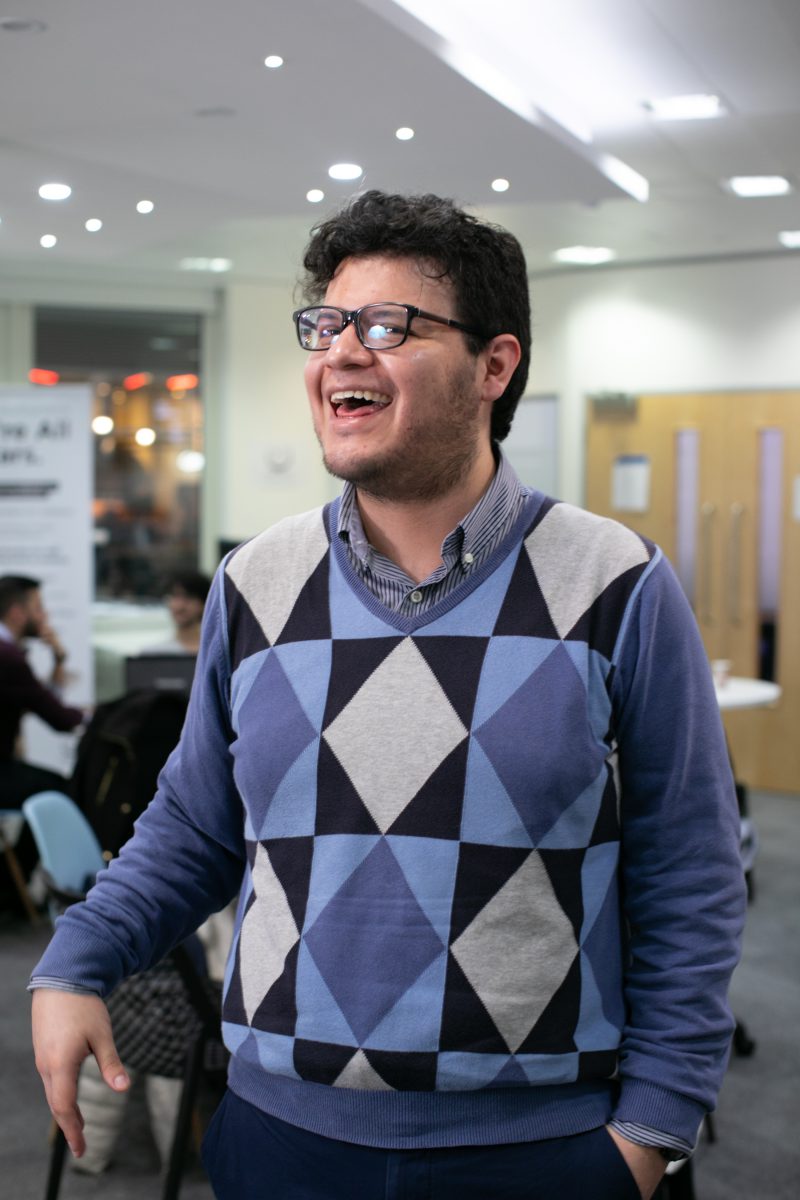
MSc Cyber Security with Advanced Practice
Why did you choose to study Cyber Security with Advanced Practice?
My interest in technology started when I was a teenager. I used to be curious about IT and when my father bought me my first computer, I immediately fell in love with technology. That was when I knew I wanted to start a career in IT.
I went onto study a Bachelor’s in Electronics and Networking along with training myself by reading books, blogs, and watching videos on how to perform hacking techniques. At the beginning I did it through curiosity, and then I realised how far that knowledge and skills could take me so I decided to follow a career in cyber security.
What were you doing before the programme?
I was living in Ecuador studying a Bachelor’s degree in Electronics at university. I then went into an IT Engineering role for 6-7 months, but then I realised it wasn’t for me. I was even quite disappointed in my university course because I expected to learn a lot more than I did.
Before coming to Northumbria University London, I did some professional qualifications such as Linux System Administration and Cisco CCNA along with some other courses in Ethical Hacking.
Why did you choose to study at Northumbria University London?
I knew which area of technology I was interested in, but in Ecuador, cyber security wasn’t really promoted. Companies out there were mainly looking for IT Engineers and that’s not the route I wanted to follow. When I met Magdalena from Northumbria University London campus, she explained the Cyber Security course to me and I found it very interesting. After that conversation I decided to take the opportunity and move to London.
How did you feel about returning to education in the UK?
When I joined and heard the background my classmates had, I felt really nervous. Everybody seemed to have 2-3 years’ experience in IT and security, so I thought they would be a lot better than me. It really helped though because I could listen to their experiences and learn from them.
The first month of being here was tough because I wasn’t used to writing reports in English as my native language is Spanish. Beside my studies, I put in a lot of effort to help me get used to the English language by reading books and listening to the news. This helped me with my vocabulary and also taught me different ways to use words.
Did you feel supported by Northumbria University London with your move to the UK and returning to education?
I would say that I was very supported during my time here. It’s nice that there’s not a big class size either. I think we had around 9-10 people in our class and that meant that the lecturers could be more focused on us individually as well as creating a more relaxed environment.
Moving back to the UK was a big thing, but the lecturers even supported me with guidance on how to do things like open up a bank account, register with a GP, etc.
Tell us about your internship
I started working my internship at a small company called The CyberFish back in March. I have really enjoyed my time working here; my manager is very supportive and the role is always kept interesting by having new projects to discuss and work on every day.
What is your job role in the internship?
My main role is to carry out research in order to train people, but now I am getting more involved in targeting the cyber threats on organisations. I have also done vulnerability assessments to SMEs following penetration testing methodologies.
On a daily basis, we normally have 1-2 meetings at the office to discuss new projects. I am currently developing a project with my colleagues which involves creating a GDPR wargame portfolio to assess how well-prepared organisations are against cyber security incidents, involving personal data breaches.
What has been your biggest challenge on the programme so far?
During my internship, I had to host a conference. I was really nervous about it as there were almost 40 people attending and they all had some really big backgrounds in technology, a lot more experience than me. I was worried that they were going to exploit me with a lot of questions, but I loved it and that’s why I have decided to continue working within the industry.
Do you feel that this programme will provide you with a lot of career opportunities?
Yes, I already get calls from recruiters and companies at least once a week, and not just within the UK, but other EU countries too. There are a lot of opportunities out there, but people need to understand that in order to get involved in cyber security, you must be highly skilled. You can have experience and skills in IT, but becoming an ethical hacker doesn’t just happen after a few lectures.
How would you say the course has benefited you the most?
I would say that the MSc Cyber Security with Advanced Practice programme has really opened my mind. Before I assumed that if you worked in the industry you just stayed behind a computer and carried out some penetration testing. However, now I understand that there’s a lot more to cyber security than what I first thought and that’s all thanks to my lecturers who were able to expand my mind and show me what the industry is all about.
What has been your favourite module?
I would say my favourite module has been Information Governance because it doesn’t just teach you how to handle a security breach, it also teaches you the importance of effective communication between different stakeholders. This is really important because who you are helping needs to know what you’re talking about, so you need to learn how to explain the technical stuff in simplistic terms such as the impact it will have to the business, along with the strategic decisions to achieve consistency.
This module has helped me a lot in my internship role because now when I get a technical report, I can explain what has happened, why it has happened, what potential risks could happen, and give my suggestions to prevent this from happening again.
What would you recommend to someone who is looking to kick-start a career in the Cyber Security industry?
Firstly, I would recommend doing cyber security because you love it. As human beings, our main goal in life is to pursue happiness and to do what we love. Considering a career in cyber security is a winning decision because you have a lot of career paths you can follow through such as Digital Forensics, Penetration Testing, Secure Software Development, Data Analytics, SOC Analyst, and many more.
If you do decide to follow one of these career paths and it doesn’t make you feel comfortable, you can easily change and follow a different pathway because you would have gained the experience you need to move on. It’s important that you go into a career that makes you happy and confident and not just do it for the money because that will be a waste of time.
Another thing you need to consider is that this type of career demands a lot of time and you need to be willing to invest it if you want to succeed. There will be a lot of practicing and learning on your own, but it will be beneficial in the long run. I have met people who haven’t got any of the qualifications and they are highly skilled because they put in a great deal of effort every day to learn.
A Masters doesn’t guarantee a job position, you do. Cyber security businesses are looking for people who are truly engaged within the field and are highly skilled. If you don’t have these qualities, then you’re not going to have the value you need to get into this competitive market.
View course
“I chose Northumbria because the AACSB double accreditation for the Business School was attractive to me. The ability to develop my language skills was another element which I liked, I wanted to improve my English and work with a diverse group of people. I most enjoy being in an environment which is so diverse as it gives you more vocational skills. Participating in group work has encouraged me to adapt my learning style and ability to work with a wider range of people. The teachers here are very open and encourage us to keep in touch with them regarding our work.”